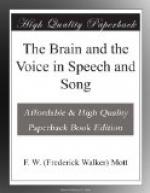Herbert Spencer says that “our intellectual operations are indeed mostly confined to the auditory feelings as integrated into words and the visual feelings as integrated into ideas of objects, their relations and their motions.”
Stricker by introspection and concentration of attention upon his own speech-production came to the conclusion that the primary revival of words was by the feeling of movements of the muscles of articulation; but there is a fallacy here, for the more the attention is concentrated upon any mental process the more is the expressive side brought into prominence in consciousness. This can be explained by the fact that there is in consequence of attention an increased outflow of innervation currents to special lower executive centres, thence to the muscles, but every change of tension in the speech muscles is followed by reciprocal incoming impressions appertaining to the sense and feeling of the movement. The more intense the sense of movement, the greater will be the effect upon consciousness. In fact, a person who reads and thinks by articulating the words, does so because experience has taught him that he can concentrate his attention more perfectly; therefore his memory or understanding of the subject read or thought of will be increased. Very many people think and commit to memory by this method of concentrating attention; they probably do not belong to the quick, perceptive, imaginative class, but rather to those who have power of application and who have educated their minds by close voluntary attention. Galton found a large proportion of the Fellows of the Royal Society were of this motor type. But the fact that certain individuals make use of this faculty more than others does not destroy the arguments in favour of the primary revival of words in the great majority of persons by a subconscious process in the auditory centre, which is followed immediately by correlated revival of sensori-motor images. Although the sensori-motor images of speech can be revived, it is almost impossible without moving the hand to revive kinaesthetic impressions concerned in writing a word. Both Ballet and Stricker admit this fact, and it tends to prove that the sense of hearing is the primary incitation to speech.




